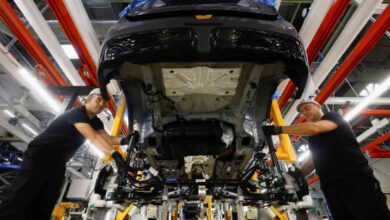Alternative for Germany wins first regional elections
The Alternative for Germany party has won elections in the eastern region of Thuringia, the first time a far-right party has won a state election in the country’s post-war period.
According to preliminary results, the AfD won 32.8 percent in Thuringia, far ahead of all other parties. The center-right Christian Democratic Union (CDU) came in second with 23.6 percent.
In the neighbouring state of Saxony, public broadcaster ZDF’s projections show the two parties in a tight contest, with the CDU projected to win with 31.9% and the AfD coming in second with 30.6%.
Tino Chrupalla, co-leader of the AfD party, described the party’s results in Thuringia as “shocking”.
“One thing is clear: the will of the voters is for political change, both in Saxony and Thuringia,” he said. “If you want to have credible politics, you cannot do it without the AfD.”
The result is a disaster for the parties in Chancellor Olaf Scholz’s three-way coalition, with the Social Democrats, Greens and Freedom Party all forecast to drop to single digits in both states.
In Thuringia, the SPD had its worst result in a regional election in post-war German history, gaining just 6.1 percent of the vote.
They reflect growing frustration among East German voters with a government that many associate with high inflation, economic stagnation, soaring energy costs and constant infighting.
But they also show that voters are increasingly moving away from the centre towards populist parties on the political fringes.
Omid Nouripour, co-chair of the Green Party, described the election as a “turning point”.
“People in the cultural world, people from immigrant backgrounds, people who are at Gay Pride are really scared,” Nouripour said. “We have to stand with them and defend democracy.”
The AfD was not the only party to benefit from East German anger: they also voted in large numbers for a new far-left party, the Sahra Wagenknecht Alliance (BSW), which won 15.8 percent of the vote in Thuringia and was predicted by ZDF to win 11.8 percent in Saxony.
Voters were drawn to both the AfD and the BSW because of their opposition to the war in Ukraine. Both parties have been highly critical of Germany’s arms supplies to Kyiv, as well as Western sanctions against Russia, and have called for negotiations to end the war.
The results show that 34 years after German reunification, a majority of people in the country’s two former communist eastern regions are deeply disillusioned with the centrist mainstream parties and disappointed with the way Germany is run.

Despite its impressive performance in Thuringia, the AfD will not be able to form a government there. With no other party partnering with it, it will not have the parliamentary majority needed to govern.
The AfD, founded 11 years ago by economists angry with eurozone bailouts, has transformed itself into a hard-line nationalist, revisionist and strongly anti-immigration party.
Germany’s domestic intelligence agency has designated the party’s local branches in Saxony and Thuringia as “right-wing extremists”.
In Thuringia, the party is led by Björn Höcke, a nationalist who has been fined twice this year by a local court for using banned Nazi slogans in speeches to supporters.
However, it may be difficult to form a viable coalition without the AfD. For example, for the CDU to take power in Thuringia, it may have to partner with the BSW, an option that many in the centre-right party would find difficult to accept.
Wagenknecht, a former communist widely seen as an apologist for Russian President Vladimir Putin, has made a change in Germany’s policy toward Ukraine a precondition for any coalition talks.
She said her voters wanted to see “a different foreign policy in Germany”.
“They want more peace, more diplomacy, and that is our condition. [joining] one government,” she told ZDF.
That has caused outrage within the CDU, which remains steadfastly pro-Ukrainian and has put pressure on the Scholz government, which is Kyiv’s second-largest military aid provider after the United States, to provide more weapons.
Höcke took a similar stance to Wagenknecht, saying in a campaign speech that the AfD opposed Germany being “dragged into war with Russia by some eccentric Western elites”.
But it may even prove impossible for the CDU to form a government with the BSW. ZDF analysis shows that even a three-way coalition between the CDU, BSW and the Social Democrats would fall one seat short of a majority in the 90-seat Thuringian parliament.
The campaign was also overshadowed by a terrorist attack on 23 August in the West German town of Solingen, when a man stabbed three people to death and injured eight others. The man, a Syrian national suspected of being a member of Isis, was arrested a day after the attack after turning himself in to police.
Both the AfD and the BSW seized on the incident to claim that uncontrolled immigration had led to a rise in violent crime on Germany’s streets and to demand the deportation of asylum seekers who had committed crimes.
The dismal performance of the three parties in Scholz’s coalition – the SPD, the Greens and the Freedom Party – has led to speculation that one of them could pull out of the government, leading to early elections.
But experts say such an outcome is unlikely. All three poll so poorly nationally that they have little interest in facing voters before the next election, scheduled for the fall of 2025.




